Scuba Part I: Saltwater Dreams Made Reality
Meet Amanda, experienced scuba diver and life designer
This week kicks off a Scuba Diving Mini-Series. Over the next several weeks, we will meet an avid scuba diver, a business-building dive instructor, an ocean advocating industry entrepreneur, and a dive guide who intentionally built a life she loves. Through these different lenses, we will experience the joy and awe of ocean-centered adventure!
I am so excited and honored to start this series with an interview with Amanda. I met Amanda and her husband, Dan, on a dive trip to Cozumel. We were all diving with Scuba Cindy (who we will meet next week) and would exchange stories over warm food at the end of a tiring yet invigorating day spent under the water.
Amanda is currently living the life I envision having a few decades from now. She had a bit of an unconventional career path and was able to retire early. She now can travel freely to spend the majority of her time diving and doing the things she loves. With over 600 dives, Amanda has truly built her life around her passion of exploring the world’s oceans. Let’s dive into this adventurer’s story.
Introduce yourself and describe how you designed your life to be able to lean so heavily into your passion of scuba diving.
My name is Amanda. I’m 56, married to my husband Dan and live in Tacoma, Washington. In 2019, my husband and I retired from education with our final six years having worked in Nigeria at the American International School of Lagos. I spent my career in elementary education teaching everything from P.E., Grades K-4, reading to beginning Spanish, as well as working as a reading specialist and coach of teachers.
Living and working in Nigeria was definitely not for the faint of heart - it’s a crazy, busy and loud country, with about 20 million in the greater Lagos area alone. Our family freaked out when we told them we had accepted jobs in Lagos, but honestly, we had an amazing experience and still stay in touch with many of our teaching friends and families of former students. This experience working overseas was a primary factor in us being able to fast-track our retirement.
Honestly, one of our most important goals for retirement was to put ourselves in a financial situation where we could travel as much as possible. I believe that leaving our public school jobs, selling nearly everything we owned and working overseas while we saved like crazy was the catalyst in helping us achieve our goals. Had we stayed in our normal life at home, unwilling to take a risk, stuck in a big house with a big mortgage, this never would have happened. Even while we were living overseas, we made sure to take a couple of dive trips a year, alternating diving with land holidays.
Of course the more we dove, the more we wanted to dive. While still in Nigeria, we made the decision to not return to a big place in the US. Instead we bought a small condo, which has allowed us the freedom to “lock it and leave it” and has also freed up money for us to do the things we want to do in retirement.
Every adventure has its hardships. Tell us about the personal limiting beliefs or external barriers you grappled with along the path of learning to dive.
Actually, I learned to dive when I was 21. I was definitely afraid to try at first, but then just decided to go for it. We live in a cold-water location, which often has limited visibility. During my first few years after being certified, I was pretty much broke, so local diving was all there was for me. A trip to Grand Cayman exposed me to the awesomeness of warm water diving, and of course, after diving there, it was hard for me to want to try and stuff myself into my 7mm farmer John wetsuit and don 28 pounds on a weight belt, not to mention have the shock of 54 degree water running down the back of my neck!
When I married my husband Dan, he was not a diver, and actually told me that he was claustrophobic, so he was only interested in snorkeling. At that point, I figured I would just end up having to give up diving. It’s a good thing I didn’t give up on him, though! In 2005, I asked him if he’d be willing to do a Discover Scuba Diving course while we were on a trip to Cancun. After a couple of hours of theory with the instructor and a quick dive to 30 feet, he surfaced and declared that he wanted to go ahead and get certified. Hallelujah!
The funny part of this story is that when we got back to Tacoma and signed him up for the PADI Open Water course, the instructor convinced him that he should continue and get his Advanced Open Water (AOW). Not only that, they would give him a discount, PLUS, lucky me could also get the discount. I hadn’t been diving in the Puget Sound for about 7 years by this point, so I really was dreading getting in that cold water. I made him a deal - I’d take the AOW class if he promised me I NEVER had to dive in the Sound again - only warm water for me going forward. He agreed and we haven’t looked back.
Speak to the importance of mindset, especially in dealing with setbacks or failures.
Just ask my mom, I am a stubborn one. Born a Taurus, I don’t readily accept failure and am definitely not willing to give up when I’ve set my mind to something. That’s not to say I don’t get nervous, I definitely do. As a matter of fact, on our recent dive trip to Cozumel, we went to the Yucatan Peninsula for a day of cenote diving with CenoteXperience. Cenotes are natural sinkholes in the landscape, forming pits of beautiful turquoise water. The first dive we did was an advanced pit cenote dive called Angelita. I would be absolutely lying if I said I was not anxious before that dive. I actually had a freak out moment(s) during the dive as we approached the milky halocline of hydrogen and sulfur at around 90+ feet (haloclines are areas where the fresh and saltwater mix, creating an area with significantly reduced visibility).
Everything about diving in this freshwater felt weird. I felt super heavy. My buoyancy was sucky (and I usually have perfect buoyancy). I hadn’t worn a 5mm suit in forever. The lack of visibility through the halocline was scary for me. Josh, our guide, was amazing, though. He helped me settle down and I was able to enjoy the rest of the dive. Mind you, I hit 600 dives that day. Just because you’re a super experienced diver, doesn’t mean you won’t have your moments. It’s ok to be nervous.
Describe for us one of your favorite dive adventures!
Raja Ampat will always be the trip that we measure all trips against. It was 2016 and our second liveaboard ever. We went on a 10-day trip on the Indo Siren, which sadly burned last July. We loved the ship. Our cruise directors Ken and Evan, as well as the entire crew, were so fun. We saw such a variety of small and big stuff. We’d never experienced marine diversity like that. And muck diving - we had no idea even what it was before that trip, but now I am a definite fan. Muck diving is diving where there is a sand or silty bottom and usually you’ll find all kinds of cool and weird creatures that you don’t normally find on the reef. Sometimes there can be junk or trash. It’s not pretty, but you can spend the whole dive searching a small area for the little macro critters like nudibranchs, small cuttlefish, pipefish, etc. I love it so much! It’s actually my favorite for photography.
The highlight of our trip was getting to see the mantas for the first time. I’ll never forget how exciting it was having them “fly” over the top of us to and from the cleaning station. Dan was still a newish diver with less than 100 dives. He was struggling with his buoyancy and staying stationary in the current. It always cracks me up to remember how one of the dive guides finally had to use the reef hook to hook him onto the reef and inflate his BCD a bit. The mantas were literally swimming above him within a foot or two above his head.
What resources did you utilize along the way to become a more competent diver?
There hasn’t been anything in particular except I think that it has just been making sure we dive A LOT. Over the years, I found that if we waited too long between dive trips, my husband used to get pretty anxious before getting in the water. I’ve always told him it’s like riding a bike or skiing. You hop back in and everything will be as you remembered it. Your muscle memory takes over. It’s true, but anymore, I like to make sure we don’t go too long between dives.
In your dives and travels, is there a topic that you have become passionate about or that has altered your worldview in some way? Describe this experience for us.
Having lived in Nigeria for six years, and also having traveled all over the world to plenty of impoverished countries, my world view has definitely changed. I believe that our country and our democracy are unique and sacred. Our constitution and form of government were designed to protect the citizens by giving them voice and to protect these freedoms. We have free public education. We’ve seen in other countries like Nigeria that there isn’t the same priority of quality education. Not educating your citizens keeps them small and is a method of control. Imagine having 100 students in a classroom and one teacher, who may or may not show up to teach that day because their pay is abysmal. Now imagine that happening here in the US. How might our country be different as a result?
What have you learned about yourself from becoming a scuba diver? How has it changed you?
Not necessarily learned from being a scuba diver but from years of life experience: I am stronger than I think I am and I can do hard things.
Here’s an example - My husband’s youngest son, Cayden, was diagnosed early on (at age 8) with Ulcerative Colitis (UC). Shortly after that the doctor suspected another issue was present. After having a liver biopsy, it turned out he had a rare liver disease called Primary Sclerosing Cholangitis (PSC). This is basically a cirrhosis of the liver which most often results in the patient needing a liver transplant.
After years of health issues, in early 2010, he had an internal bleeding event which required a Medivac trip from our home in Washington to Stanford in California. During that visit, it was determined that the need for a transplant was imminent, AND because of the nature of this disease, waiting for a cadaver donor was not advised. The doctor told us that other organs could start to shut down before his “MELD” score (the way they determine priority for a cadaver donor) got high enough to be approved for a new liver. Knowing I was an O+ blood type (universal donor), immediately, and without much consideration for any health consequences for myself, I volunteered to do the medical workup to be considered as a donor. Within a week of returning back home from Stanford, we got the call that I was approved to be his living donor.
This all happened during late winter/early spring of 2010, and by this time, he was 16 years old. We knew that waiting until his junior or senior year in high school was not a good plan, so within a month, we had rearranged our life so we could take time off from work and spend the rest of the school year in California for the transplant and recovery. THIS was a hard thing.
In the month leading up to the transplant, I was definitely afraid. I had so many sleepless nights, but once I made up my mind to do it, not following through was never an option for me, even when the hospital social worker I met with advised that I could back out all the way up to the morning of the transplant.
Fast forward 15 years later, Cayden is a healthy and happy 31 year old man. He still deals with his Ulcerative Colitis, which is currently under control. There is always a possibility his PSC could come back if his UC isn’t under control, but he knows how to take care of his health. As for me, the recovery took a number of months, but I have not had any negative effects from the surgery, except for the wicked scar to show for it. I always jokingly tell people when we’re on dive trips that I was bitten by a shark. Don’t worry, afterward, I tell them what REALLY happened.
Do you have any self care practices or daily routines that help set you up for success?
After tearing my ACL and meniscus in 2021 and needing a full ACL replacement, I never take for granted my strength and mobility anymore. My husband and I have a “use it or lose it” attitude. When we are home, we get to the gym four times per week and lift heavy weights. We try to ensure that we get in 8-12k steps each day when we aren’t on a travel day. The weights have really helped in climbing those boat ladders with my full kit on. Just keep moving is our attitude. My plan is to still be diving into my 80s and still be able to climb the ladder with my kit!
What advice do you have for another woman wanting to create a lifestyle that allows her to pursue her passion?
Decide what you want. Be specific. There’s a saying that roughly goes “what you think about persists”. Figure out what you need to do to get there.
Think outside the box (we sold everything and moved to Nigeria to work). Don’t let anyone minimize your ideas or deter you from your goals. I remember years ago my husband and I created vision boards. Pretty much everything on that board came true for me.
Any diving specific resources you would like to share?
I love Cindy’s Scuba Women Facebook group! I finally met Cindy in Cozumel this season, and she is an absolute kick in the pants. I love the group so much, because there’s a lot of positive support and advice from just women without the snarky behavior. If some of that creeps in, the Mods are immediately on it.
What additional adventures are coming up next on the horizon for you?
We are headed to the boot of Italy and Sicily next month. Then, we’re off to Fiji for more diving at Volivoli and Paradise Taveuni for the second time. We absolutely love the soft coral life there. Later in the year we have a liveaboard on the Rocio del Mar to the Sea of Cortez and then 4 weeks of diving in Indonesia at Wakatobi (their resort and their Pelagian liveaboard), Lembeh and Bunaken.
Where can our readers find you? Use this space to promote your work or the causes you are passionate about. We want to support you!
You know, I used to have a blog with the same name of my Instagram handle, but I discovered that I was too much of a perfectionist for it to be fun to write blog posts about our travels. I do post underwater pics on Facebook (Amanda Luce) and sometimes on Instagram. On Instagram I’m scubatravelfoodie.
Thank you, Amanda! I find this story so inspiring. There is a lot of power in envisioning the life we want and working to take action to manifest it.
My parting question for you today is: what is on your vision board and what do you need to do now to make it a reality in the future?






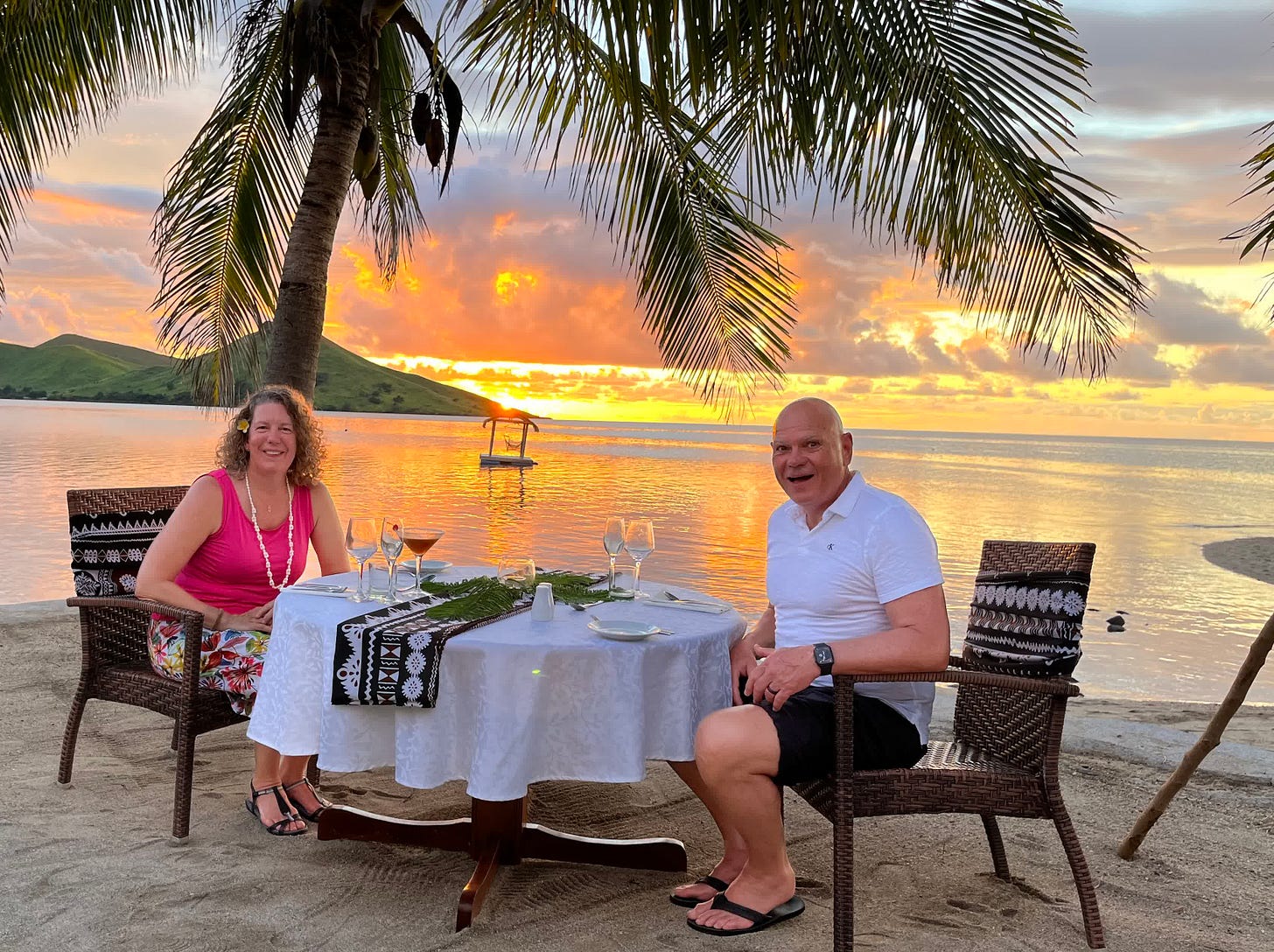
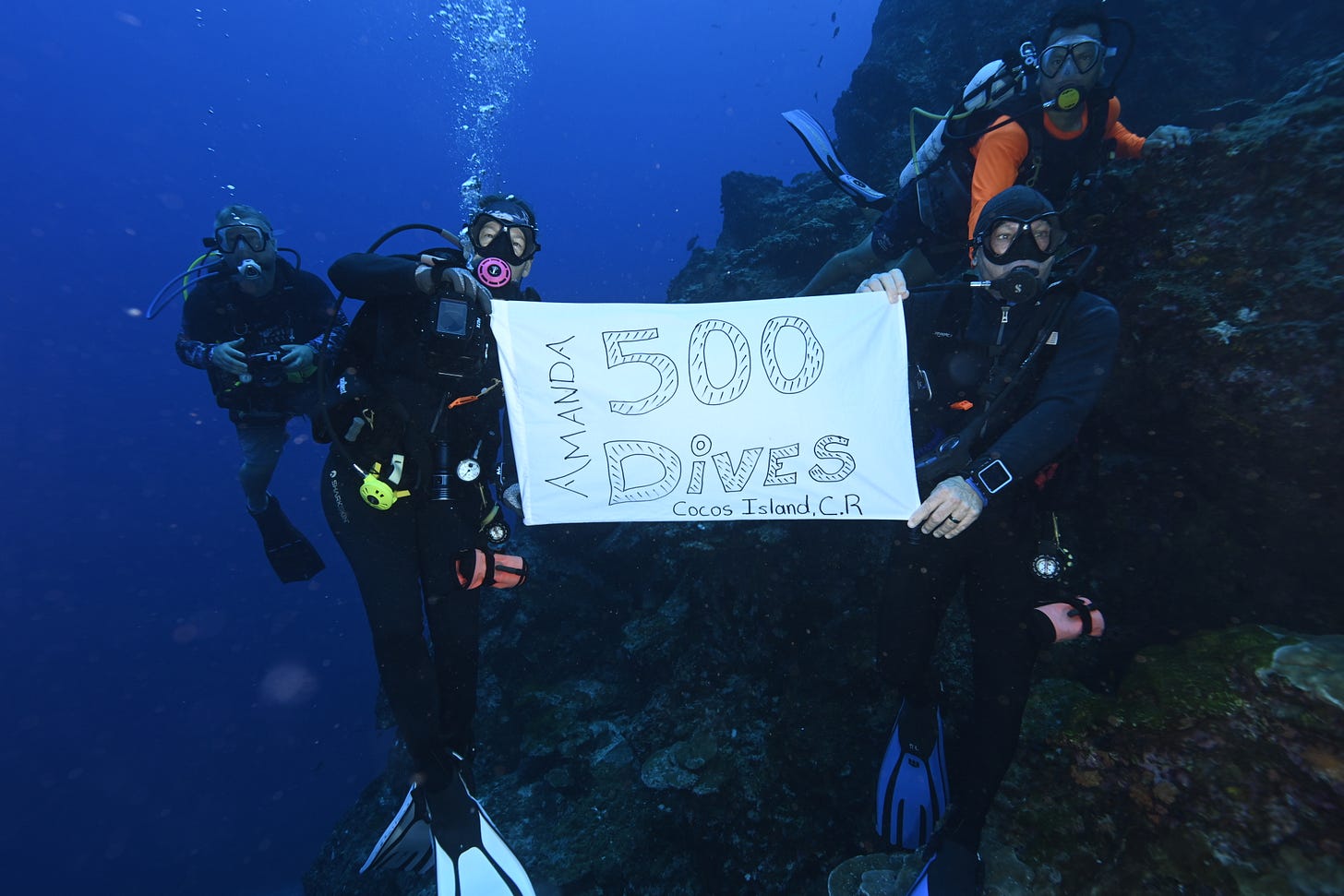
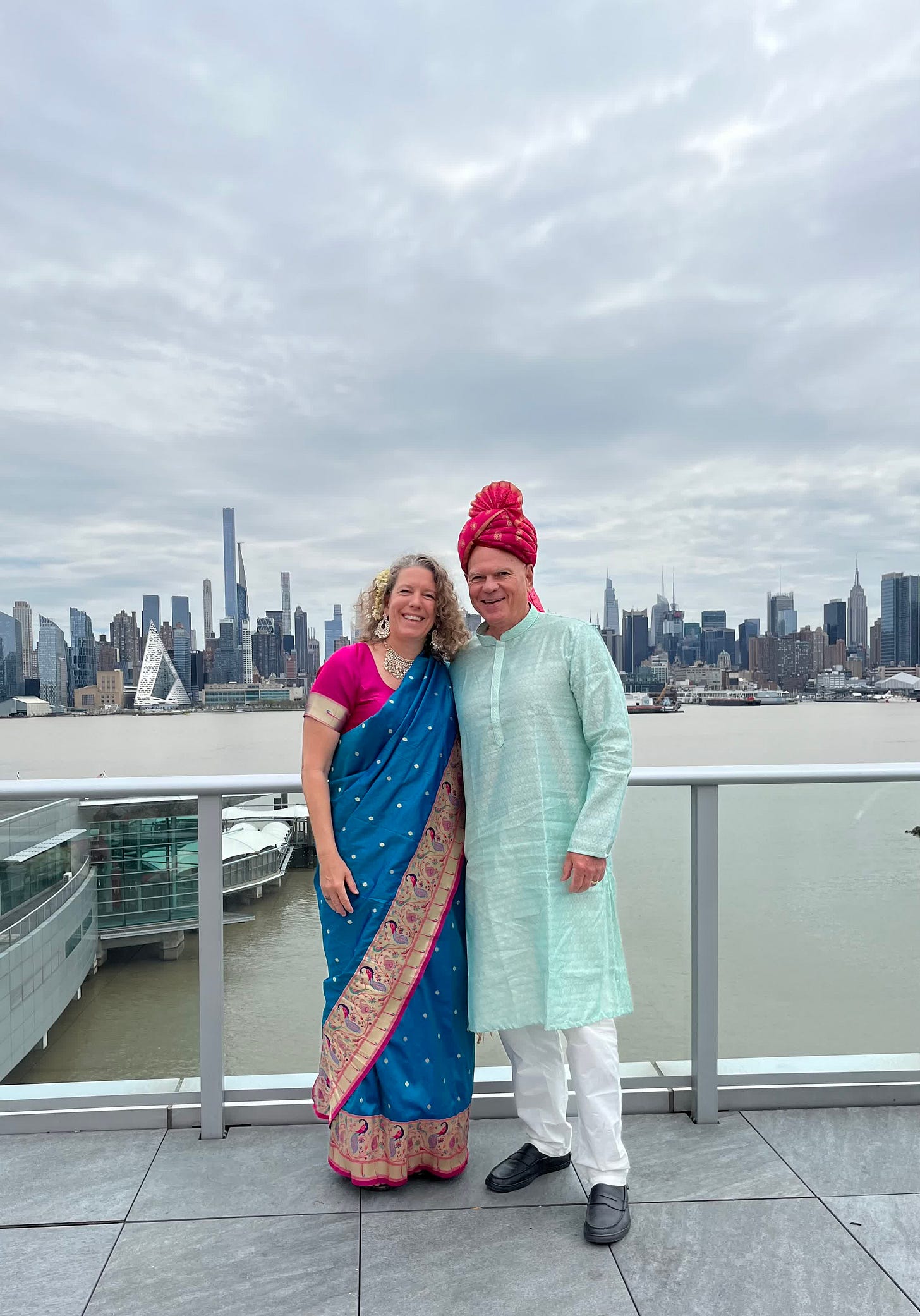
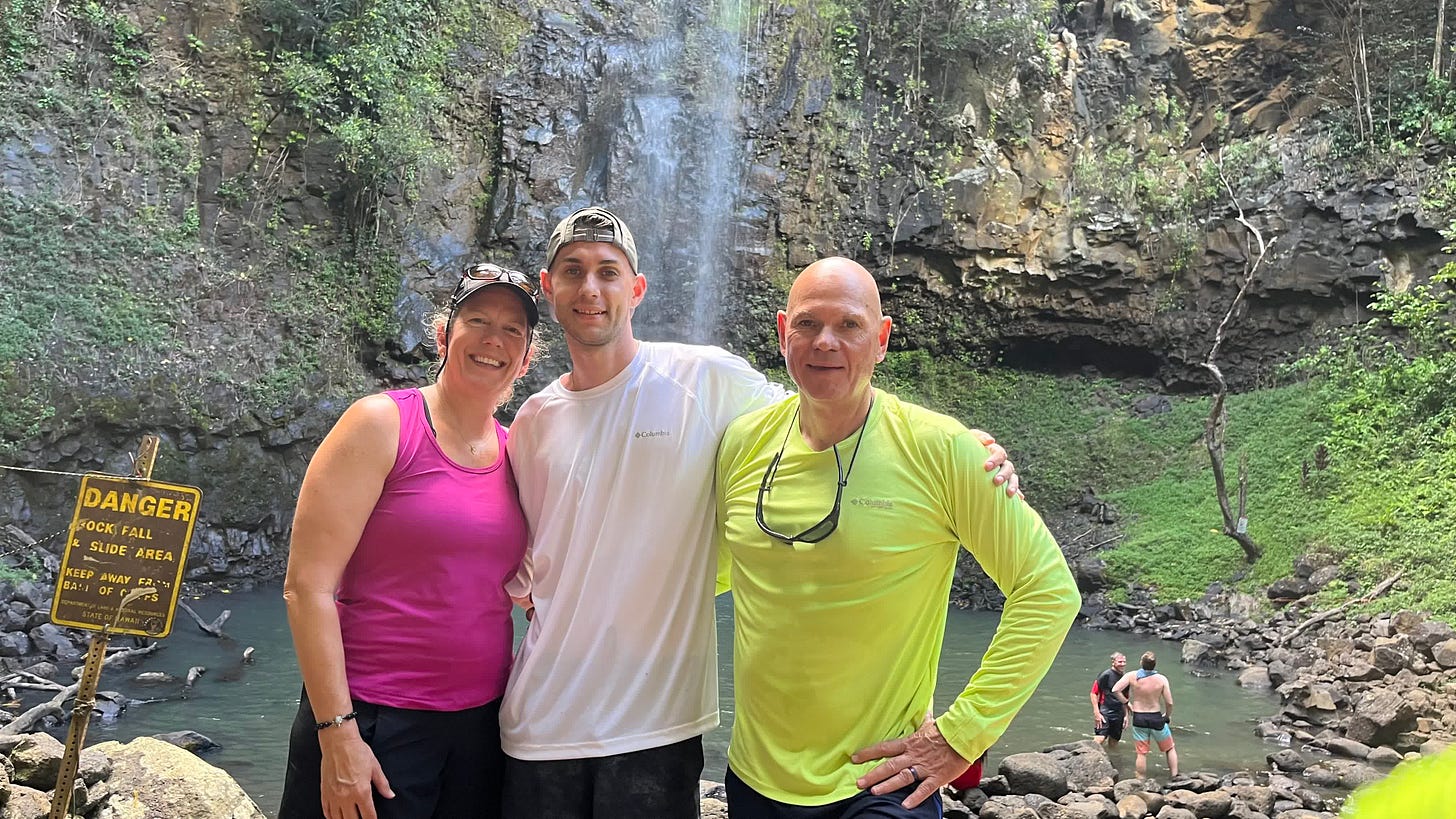
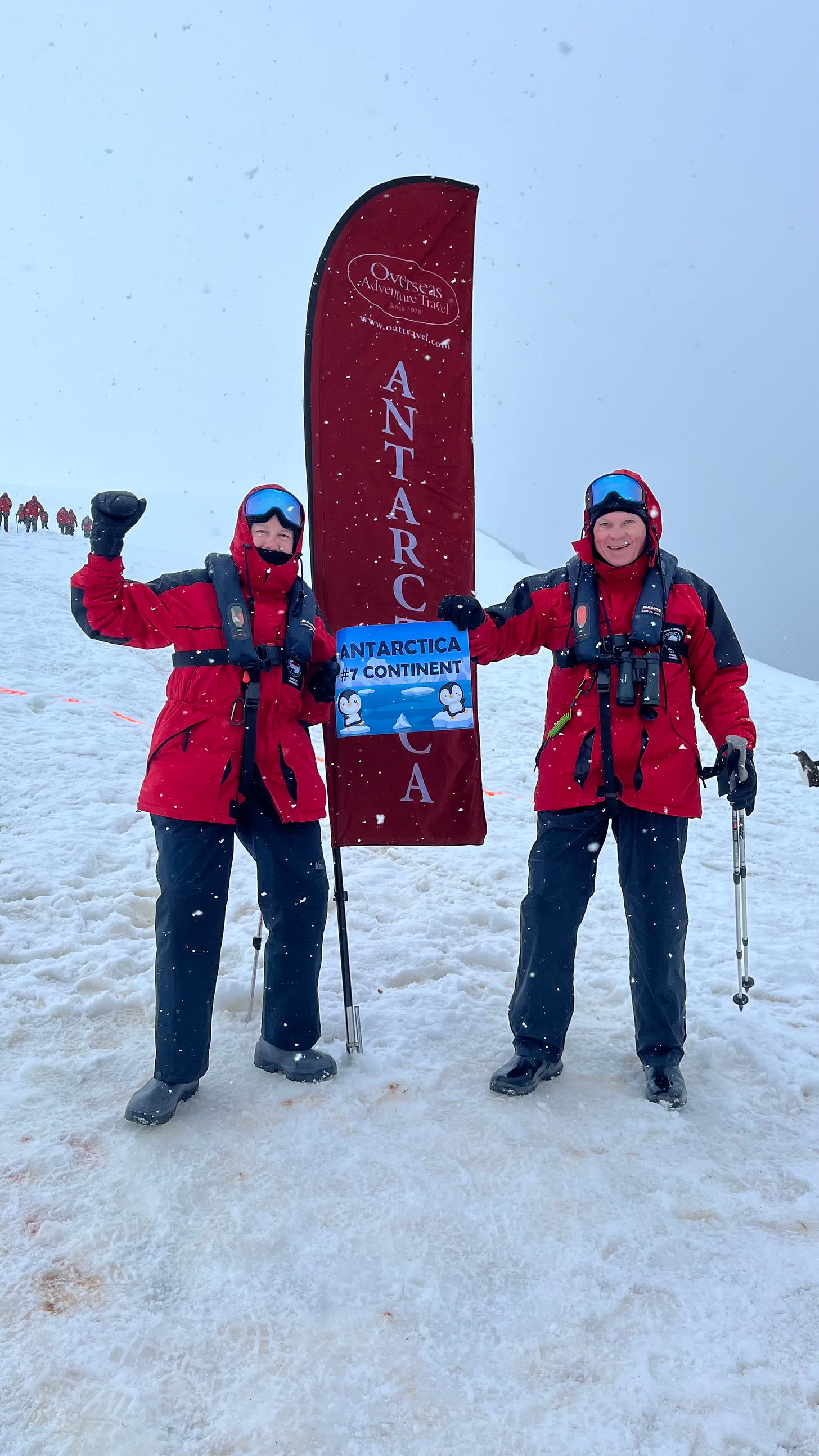
I'm so looking forward to this series and was overjoyed to read about Amanda's experiences (and wildly generous life choices!!). Happy coincidence is that my (metaphorical) vision board includes a scuba certification within a year, and this is just more encouragement and inspiration to do it! 🤿